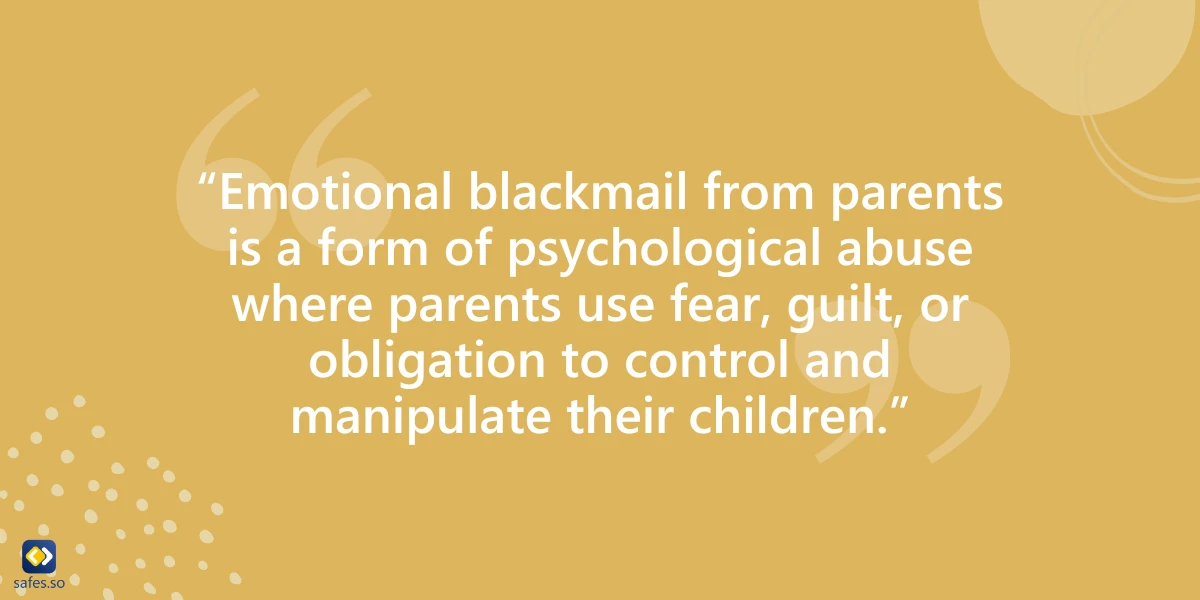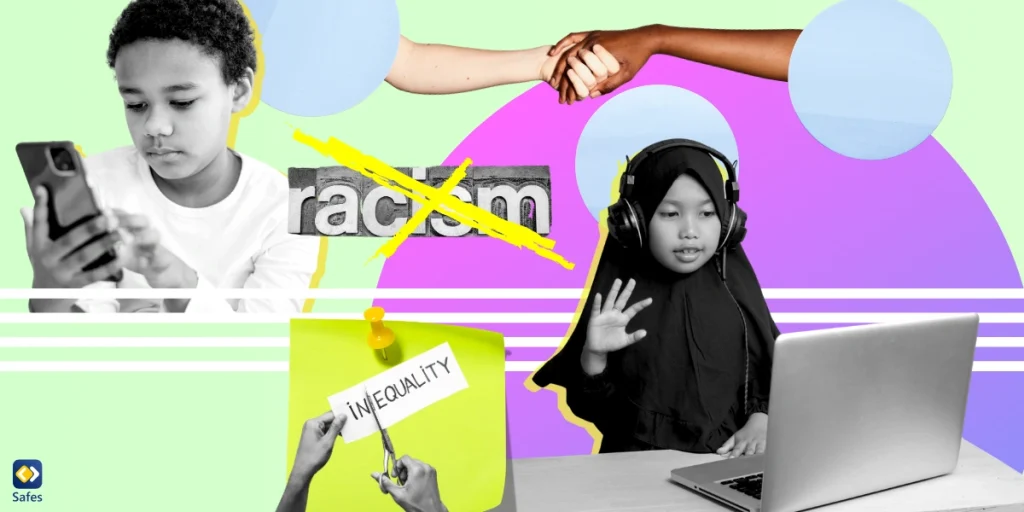Emotional blackmail is defined as manipulative behavior that can be highly damaging in any type of relationship. It’s a form of psychological abuse where the perpetrator uses fear, guilt, or obligation to control and manipulate the victim. In a family setting, it can be especially harmful to children, who are often the target of emotional blackmail from their parents.
Download and Start Your Free Trial of the Safes Parental Control App
It’s important to recognize emotional blackmail in parent-child relationships because it can lead to a cycle of abuse that is difficult to break. In this blog post, we will explore what emotional blackmail is, how it manifests in parent-child relationships, and ways to break the cycle of emotional blackmail in your family.
What Is Emotional Blackmail?
Emotional blackmail is a manipulative tactic used to control or manipulate someone else’s emotions, actions, or decisions through the use of fear, guilt, obligation, or other emotional pressures. It typically involves one person making unreasonable demands or threats, often implicitly or explicitly, to get another person to comply with their wishes.
Emotional blackmailers use tactics like threats, criticism, and manipulation to get what they want, often at the expense of their victim’s emotional well-being. The perpetrators may threaten to withhold love or affection, criticize or belittle their victim, or use guilt-tripping to make their victim feel responsible for their emotional well-being. They may also use manipulation tactics like gaslighting or playing the victim to gain control over them.
Emotional blackmail differs from healthy communication in that it’s manipulative and abusive. Healthy communication involves open and honest communication, where both parties are able to express their thoughts and feelings without fear of retaliation or manipulation. In contrast, emotional blackmailers use fear, guilt, or obligation to control and manipulate their victim, often leading to a cycle of abuse that is difficult to break.
It’s essential to recognize the signs of emotional blackmail and seek help if you or someone you know is experiencing this type of abuse. Emotional blackmail can be highly damaging to any kind of relationship, but it’s especially harmful in parent-child relationships because children are often the target.
What Is Emotional Blackmail From Children?
Emotional blackmail in parent-child relationships can manifest itself in both children and parents. Emotional blackmail from children refers to when a child tries to control their parents by manipulating their emotions. They might use guilt, threats, or sadness to get what they want.
Some signs of children emotionally blackmailing parents may include manipulative behavior, using guilt or obligation to get what they want, and constantly making demands without considering others’ feelings or needs.
It’s important to understand that children often use these tactics because they haven’t learned healthy ways to communicate or express their needs. They use emotional blackmail as a way to get their needs met when they feel powerless or don’t have other ways to express themselves.

What Is Emotional Blackmail From Parents?
Emotional blackmail by parents happens when parents try to control their children by manipulating their emotions. They use tactics to make them feel guilty, obligated, or afraid of losing their love or approval if they don’t do what they want.
Recognizing your own behavior in your relationship with your child can be challenging, but it’s an essential step in preventing emotional blackmail from becoming a pattern. Signs that you may be using emotional blackmail with your child include manipulating them to do something by using guilt or obligation, threatening to withhold love or affection, or threatening to disown them if they don’t comply with your demands.
Understanding why parents may use emotional blackmail can help prevent it from happening. It’s important to note that even though it’s manipulative, it often comes from a place of fear or insecurity on their part, as they might be afraid of losing control or not being needed anymore.
Emotional Blackmail Examples
In this section, we’ll explore some common examples of emotional blackmail used by both children and parents. By recognizing these tactics, you can better understand what is considered emotional blackmail and develop healthier communication strategies.
Examples of emotional blackmail by children:
- Guilt Trips: Children may use phrases like “If you loved me, you would…” or constantly compare themselves to siblings, saying things like “You love them more than me” to manipulate their parents into giving them what they want.
- Threats: This could involve threats of self-harm (“If I can’t go to the party, I’ll run away!”) or threats to damage relationships (“If you don’t let me stay up late, I won’t talk to you tomorrow”).
- Emotional Withdrawal: A child might become withdrawn or sullen, refusing to talk or engage with their parent, in an attempt to make them feel responsible for the child’s unhappiness.
Examples of emotional blackmail by parents:
- Conditional Love: Parents may withhold affection or approval, making their love contingent on the child’s behavior or obedience (“If you get good grades, then I’ll be proud of you”).
- Playing the Victim: Parents may manipulate their children by portraying themselves as the victim of the child’s actions (“You’re giving me a headache with all this arguing”).
- Obligation Traps: Parents may guilt their children by reminding them of the sacrifices they’ve made (“After all I’ve done for you, the least you can do is…” ).

What Are the Effects of Emotional Blackmail on Children?
Emotional blackmail can be damaging for children. It can lead to anxiety, depression, and low self-esteem as they feel they must choose between doing what’s right and keeping a positive relationship with someone important. This manipulation can also hinder their ability to form healthy relationships later in life.
A 2020 study published in the Journal of Child & Adolescent Trauma investigates the long-term effects of early childhood trauma, particularly emotional abuse, on adult mental health. It finds that emotional abuse correlates with higher levels of depression, anxiety, stress, and neuroticism compared to physical or sexual abuse. The research emphasizes the need for public awareness and evidence-based treatments to address the psychological consequences of emotional abuse.
| Type of Abuse | Depression Level | Anxiety Level | Stress Level | Neuroticism Level |
|---|---|---|---|---|
| Emotional Abuse | High | High | High | High |
| Physical Abuse | Moderate | Moderate | Moderate | Low |
| Sexual Abuse | Moderate | Moderate | Moderate | Low |
Breaking the Cycle of Emotional Blackmail
Breaking the cycle of emotional blackmail in parent-child relationships requires understanding the signs and reasons behind it. Parents should recognize when their child is using emotional blackmail, such as guilt-tripping, threatening to harm themselves, or withdrawing love and affection.
Responding to emotional blackmail involves calmly setting boundaries and communicating the child’s feelings without giving in to their demands. Avoiding emotional blackmail in one’s own behavior consists of being self-aware, recognizing when one is using guilt or manipulation to get what one wants, and finding healthier communication strategies.
Setting healthy boundaries in parent-child relationships is essential to prevent emotional blackmail from becoming a pattern. This involves being clear about expectations, values, and consequences, and promoting open and honest communication.
How Can Safes Improve Your Parenting?
Safes parental control app is a powerful tool that can help parents to improve their parenting skills. This app allows parents to monitor and control their children’s online activity, ensuring they are safe and protected from harmful content. With Safes, parents can set limits on screen time, block inappropriate websites and apps, and track their child’s location.
Children use a variety of smart devices with different operating systems. But you don’t need to worry because Safes can be installed on all smartphones, tablets, and computers powered by Android, iOS, Windows, and Mac.
Also, we’ve compiled a comprehensive guide on setting up default parental controls across various devices. Whether you’re using Android, iPhone, Mac, or Windows, our step-by-step resources will empower you to create a safer digital environment for your family. Start your Safes free trial today on your devices—no credit card required. Click on the links below to access tailored instructions for each device:
- Windows parental controls
- Macbook parental controls
- Parental controls on Android
- iPhone parental controls
Conclusion
In conclusion, emotional blackmail’s definition is a manipulative tactic used to control others through fear, obligation, and guilt. It can be difficult to recognize and break free from, especially in parent-child relationships. However, setting healthy boundaries and promoting open communication can help break the cycle.
Additionally, the Safes parental control app can provide tools for monitoring and controlling online activity, promoting responsible internet usage, and reducing conflict. By utilizing these strategies and resources, parents can build trust with their children and promote healthy habits while avoiding emotional blackmail.
Your Child’s Online Safety Starts Here
Every parent today needs a solution to manage screen time and keep their child safe online.
Without the right tools, digital risks and excessive screen time can impact children's well-being. Safes helps parents set healthy boundaries, monitor activity, and protect kids from online dangers—all with an easy-to-use app.
Take control of your child’s digital world. Learn more about Safes or download the app to start your free trial today!




